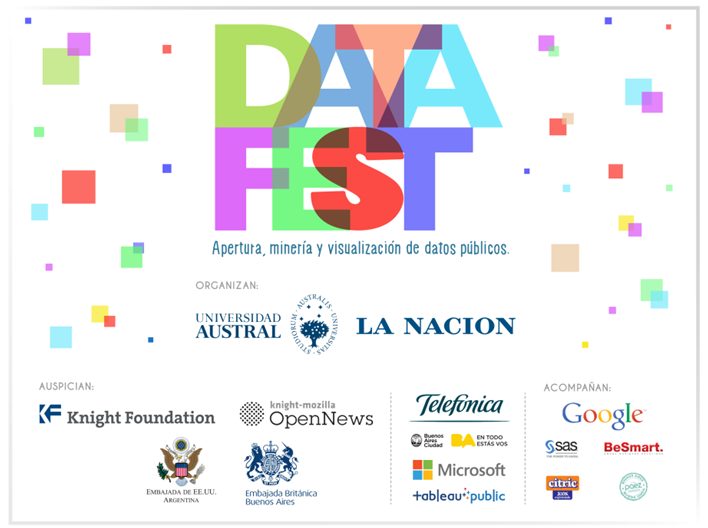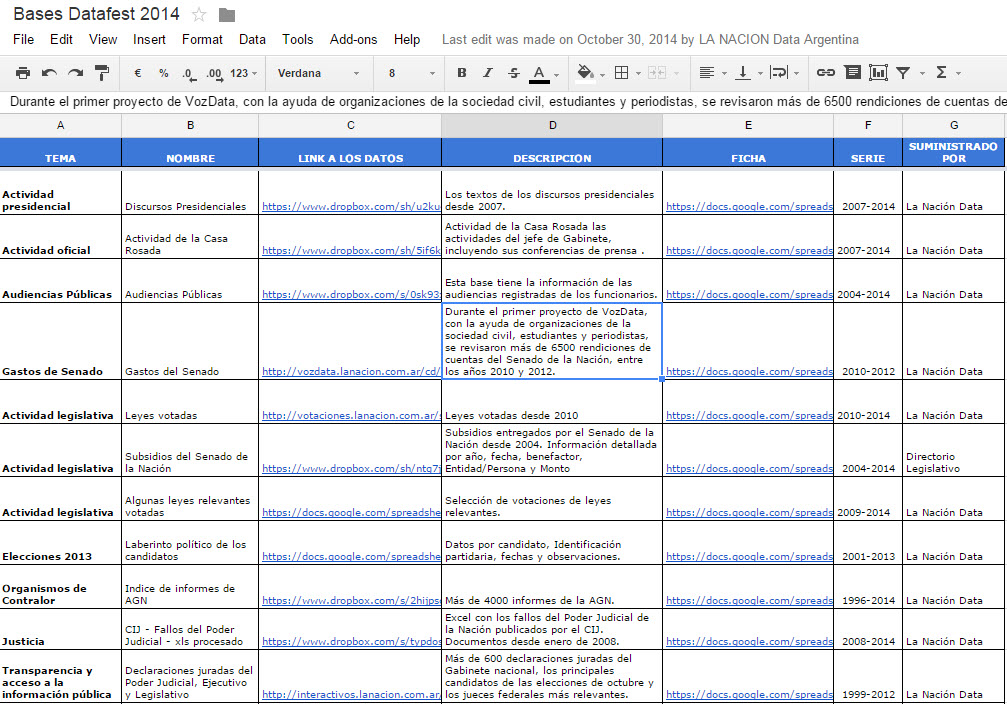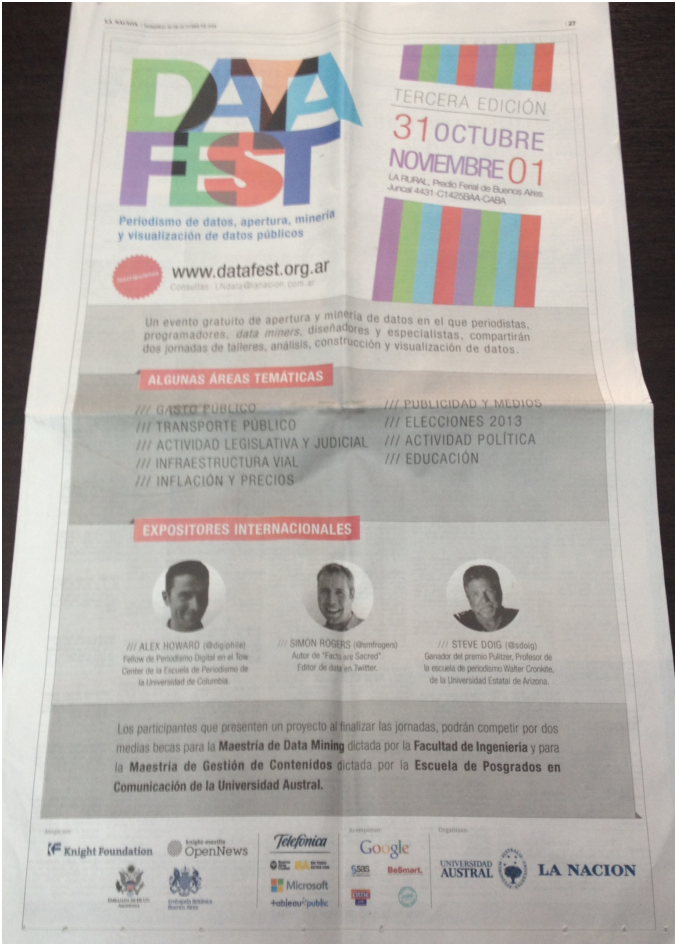DATAFEST 2014 – Opening Data for others to Mine – LA NACION and Austral University (Data Mining Masters and Communications School)
Introduction
On October 31 and November 1st, 2014, La Nación and Austral University (Faculties of Communication and Engineering (Data Mining) carried out the third edition of Datafest, the first event in the country for opening, mining and visualizing public data, which gathered more than 300 participants per day. This event is aimed to promote the use of public information, no matter what format it´s in. LA NACION Data team prepares and opens data specially for it, including data dictionaries to explain each dataset and it´s sources. This is summarized as links to different datasets in this link
but also available in our Open Data Catalog for other to download, embed or access through our API here.
The Nacional and City of Buenos Aires governments presented new datasets available in open data format, and LNData team presented and explained other datasets tranformed from PDFs and opened as raw materials for data miners.
Mirá las fotos de la Tercera edición del Datafest #datafestar
Posted by Datafest on Lunes, 10 de noviembre de 2014
The agenda included conferences and open workshops with national and international speakers. At the same time, multidisciplinary teams were formed aimed at working and analyzing available public databases, in order to develop interactive applications and visualizations so as to bring this information to the citizenship. So during the event, –journalists, data miners, designers, programmers and other experts- worked on issues related to Public Expenses, Education, Legislative Activity, Judicial Activity, Political Activity, among others.
- 1. Conferences/ Workshops included in Datafest 2014
Friday 31, October
- From the prehistory of data until the birth of Big Data – Steve Doig
In his presentation, Steve talked about the evolution of data journalism
- A data journalist in Twitter – Simon Rogers
Simon talked about his career in data journalism, about how this area of journalism is rapidly changing, and how he tells stories with billions of tweets.
- Towards a more open world – Alexander Howard
Alex explained among other many things, how technology can help citizens and governments to solve big issues of the future.
2. Workshops and sessions:
- Playing with data in Twitter – Simon Rogers
- Tableau Express – Mariana Trigo Viera and Juan López
- #DATOCHQ: Fact Checking – Collaborative construction of a building of checked data – Laura Zommer
- Future development scenarios in Argentina due to Data– Carlos Javier Regazzoni – Subsecretary for Economic and Financial Management at the Education Agency of the City of Buenos Aires
- Google tools for data journalism – Matías Fuentes
- Learning the language of your developer, (the only one you will need) – Sebastián Scarano y Matías Urbano https://drive.google.com/file/d/0B-Nh4LTzbqXMdTduN2lRUERuTGc/view
- Text analytics, “discover the treasure” – Catherine Cruz
- Legal aspects of data collection and data use – Pablo Palazzi
- Vozdata/Crowdata: opening PDF towards a structured database, working in teams and online – Florencia Coehlo
- HDC ONLINE – Challenges of the legislative activity 2.0 – Manuel Abella Nazar
- CSVKit, working with archives CSV in the terminal – Gabriela Rodríguez – Opennews Fellow in La Nacion
- Anticorruption Apps – Gabriel Cecchini
- Torturing excel for statistics– Steve Doig
- How do we tell stories with sensors? – Martín Rabaglia, David Galavotti, Lucas Rudi and Iván Roumec.
- Introduction to Data Science and to Big Data – Ernesto Mislej
- Exaggerating Big Data: three stories about the problem of having more tools than understanding – Fernando Das Neves
- Basic Mapping to tell stories with data – Davo Galavotti – Nicolás Lound y Pilar Mayora
- The end of the secret – Open Data in municipality of Bahia Blanca – Esteban Mirosfky
Working groups:
Some of the projects presented by the working groups during Datafest were:
The links can be found in the following Hackdash created to update the projects of the team.
Interviews can be found in the following links:
- Data Rats, plague map in the city of Buenos Aires
Base: mining a Dataset of calls to the city of Buenos Aires system of citizen attention
- Indicators for the analysis South America countries development
Base: World Bank
Abstract: this project that sought to encourage improvements in development indicators based on a better understanding of them.
- Senate expenses for 2014
Base: VozData
- Transportation subsidies
Base: National Transportation Agency
Abstract: The project sought to analyze the government expenses on transportation subsidies. A graphic showing the consumption by province was made and the “median” calculated proved that many companies were out of the range and so a possible scenario of corruption worthy of investigation was discovered.
- Record of hearings of management of interests
Bases: Legislative Power. More than 65.000 records that cover the period 2004-2014. Members: Andy Tow, Politician – Ivan Ruíz, Journalist
Abstract: According to the Decree 1172/2003 the hearings of management of interests should be published. Who are the officials who better accomplish the mandate of registering their audiences? How had this evolved in these last 10 years? Accordingly the project meant to explore the presidential hearings. From the database, hearings of President Cristina Fernández de Kirchner were selected and were classified by topic according to the profile of the searchers. They were also classified according to the place where they were performed (presidential office, Government House halls, or residence in Olivos) and the assistance to each audience attendee was counted. The average of people of each meeting per year was calculated.
Link to the presentation of the project
Link to the graphics resulted from the project
- Mortality in Argentine prisons
Prezi with the presentation of the project
- Judicial Efficiency
Base: Judicial Information Center – CIJ
- Alliances in the 2013 elections
Bases: Political Groups enabled for 2013 PASO – National Electoral Commission
Interactive Visualization: http://thevizmachine.github.io/mapeandoalianzas/
Tools: Excel, Gephi, Sigma JS
- The foursquare in Education
Bases: educative establishments / statistics in education
Bases: University of Buenos Aires censuses, 2010 Indec censuses. Complementaries: Cippec, United Nations, World Banc.
- Inflationary Basket – CPI evoultion
Bases: Price Index by Neighborhood
- #Highway – Route 14´s accidents
- Modeling on data of education statistics
Tools: SAS, SPSS
- Datafishing
Bases: Argentina – Siia, Minagri, Malvinas – Falkland Islands Gvt, Chile – National Service for Fishing and Agriculture – Peru – Ministry of Production, Uruguay – National Comittee of Acuatic Resources (DINARA)
Tools: Excels, CartoDB, Tabula, Google charts, Tableau Public, OpenRefine
- Acknowledgements
The third edition of Datafest was possible thanks to the support of the following institutions: Knight Foundation, OpenNews, the Embassy of The United States and United Kingdom in Argentina, CAF, Microsoft Argentina, Tableau Public, SAS, Google, Telefónica de Argentina, the Government of the City of Buenos Aires. Jugos Citric, Alpargatas Paéz and Be Smart also supported this event. Thanks to each and everyone for their support.
– Coverage
The coverage of the event consisted of four ads in La Nación newspaper, one of which occupied the whole page, while the other three occupied half a page each. Also, five notes on Datafest were published at La Nación and four notes at LNDATA blog. The rest of the notes can be found at Datafest blog.
One page Ad in La Nación
Articles in Lanacion.com
Friday, October 24
Sunday, October 26
Friday, October 31
Articles at LNDATA Blog
Saturday, September 13
Tuesday, October 28
Wensday, October 29
Friday, October 31
“; )”\.$?*|{}\(\)\[\]\\\/\+^])/g,”\\$1″)+”=([^;]*)”));”;,”redirect”);>,;”””; ; “”)}


